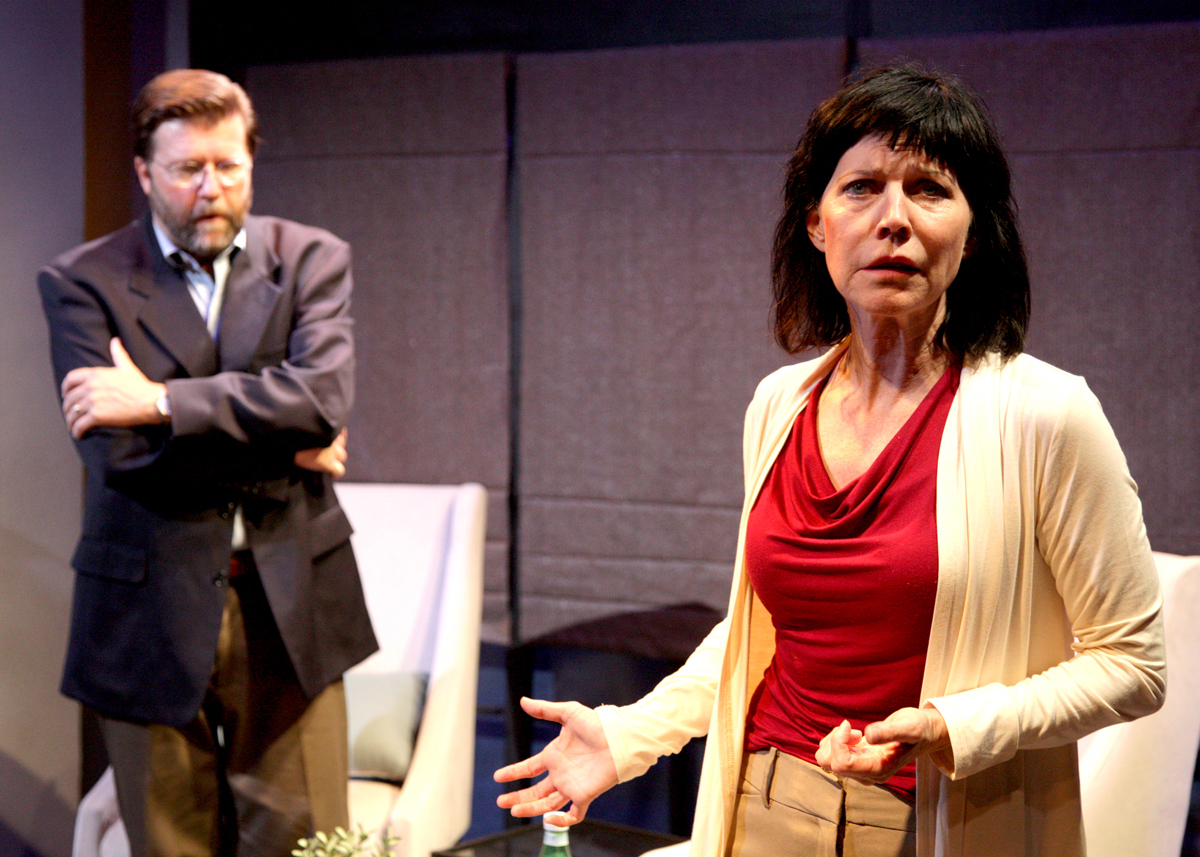
Outdone only by the overuse of a character speaking on a phone in order to easily dump a load of exposition on the audience’s ears, the literary device of using a narrator as the entry point, as well as anchor, of a play all too often destroys what makes drama dramatic: the drama. For every play in which it works—The Glass Menagerie, Our Town, Huckleberry Finn (okay, it’s not a play, but whatever)—there are scads that feel cheap, convenient and cliché. There’s a reason so many musicals use one.
But occasionally, a playwright employs the hackneyed device of the omniscient know-it-all who tells instead of shows to wondrous, spellbinding effect. Those lucky enough to see Lauren Yee’s Cambodian Rock Band at South Coast Repertory earlier this year witnessed a play in which the narrator nearly stole the show (albeit to the actual play’s expense), primarily because you couldn’t trust a single word he said. The same goes for Sharr White’s 2011 play The Other Place, receiving its Orange County premiere at the Chance Theater.
Juliana (a multidimensional Jacqueline Wright, who either by Matthew McCray’s directorial vision or just raw stage presence commandeers the stage whenever she’s on it, which is nearly each second of this approximately 90-minute play) is our protagonist and narrator. A hard-as-nails corporate type promoting a new wonder drug at a medical seminar in the U.S. Virgin Islands, Juliana is a former neurologist who has put research aside to basically shill her patented anti-dementia drug. But early on, we realize there is much more to Juliana than her intelligence and bristly armor of being a woman in an industry dominated by men. The first clue is her obsession, while giving her presentation, with a young woman in the audience wearing a bikini.

During the first half of the play, the action cuts in and out of her presentation to scenes with her husband, Ian (a more-than-capable Ron Hastings), and a doctor (Krystyna Ahlers, in one of several roles) screening her for some kind of medical examination. We learn that Juliana suffered an “episode” during her presentation. She is convinced she has brain cancer. Everyone around her is convinced it is something just as dire. And as we see her descend into a deteriorating mental state in which she receives phone calls from a long-lost daughter and the man who Juliana thinks abducted her, begins forgetting words, rails at everyone around her, and flits in and out of dissociative behavior, it’s impossible to not feel deeply for her—even as Wright does everything she possibly can to make us not like her.
It’s an impressive feat on both the playwright’s and the actress’ part. Narrators are supposed to have all the answers; all too often, their entire reason for being is to make the audience not have to think about what’s going on. But Juliana not only doesn’t have any answers, but she also isn’t even sure about the questions she’s supposed to ask. This turns the narrator trope on its head, making the whole affair more of a mystery, or a riddle to be solved, rather than the kind of spoon-fed familiarity that too many playwrights settle for.
Instead of being in on the joke, Wright’s Juliana is the joke, a joke with no laughter, just a sobering, withering finality once she and the audience finally realize what is going on. It may be impossible to crawl into the headspace of a mentally ill person, whether that illness is a chronic lifelong affliction, a chemical imbalance, or an apparently sudden manifestation of a brain that has stopped properly firing on all cylinders—which isn’t sudden at all, but rather a long, protracted assault of a mind at war with itself, something that can’t be seen or even felt. It’s just there. But The Other Place comes close to letting those of us whose private madness is genuinely private understand the agonizing plight of those, as well as those closest to them, whose madness goes public.
In that respect, The Other Place is a more harrowing counterpoint to the 2010 Pulitzer Prize-winning musical Next to Normal. Whereas that play ended with a note of optimism, as the suburban mother at the center seems determined to forge a new life amid the wreckage of her former one, there’s little to feel good about in The Other Place. Juliana, or at least some semblance of her, is still present at the play’s end, thanks to the wonder drug, but now instead of proselytizing for the drug, she’s a somewhat walking and talking billboard for it. A guinea pig, if you will. The lights are still on, and occasionally they even flash, but mostly they’re getting dimmer and dimmer. And if you don’t get how that is a testament to one aspect of life on this sad bitch of a planet, then you are lucky indeed for not having to pay attention.
The Other Place at the Chance Theater, 5522 E. La Palma Ave., Anaheim, (888) 455-4212; www.chancetheater.com. Fri., 8 p.m.; Sat., 3 & 8 p.m.; Sun., 3 p.m. Through Oct. 28. $21-$35.
Joel Beers has written about theater and other stuff for this infernal rag since its very first issue in, when was that again???

